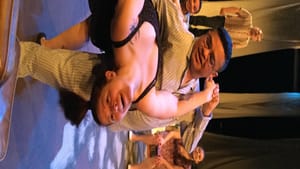Stay in the Loop
BSR publishes on a weekly schedule, with an email newsletter every Wednesday and Thursday morning. There’s no paywall, and subscribing is always free.
Stories from our neighbors
Teatro del Sol presents Carmen Rivera’s ‘La Gringa’

As theater companies across the city are taking heat for their lack of diversity, a handful of artists are taking matters into their own hands and creating opportunities to tell the stories they want to see onstage in Philadelphia—like Teatro del Sol, with its production of Carmen Rivera’s La Gringa.
José Avilés, Tanaquil Márquez, and Yajaira Paredes recently launched their bilingual theater company to tell “stories from our neighboring Latin American countries and urban American stories about our immediate neighbors.” The founders believe that by presenting these stories in Spanish and English, and at other times through a combination of both languages, they will be helping to build “a vehicle for social communion and positive cultural exchange.”
Teatro del Sol kicked off its inaugural season in April with La Gringa, which won an OBIE award in 1996 and is the longest-running off-Broadway Spanish-language playin the US.
Cultural limbo
In his director's notes, Avilés shares that "it wasn't easy growing up in Philly (as a first-generation Puerto Rican American) where you are constantly reminded of your non-American-ness." This left him feeling trapped in a "cultural/identity limbo" as he struggled with the "native tongue and cultural norms” while visiting Puerto Rico, but was also still considered other and out of place when at home in Philly.
So Avilés can relate to La Gringa, which follows Maria (Marisol Custodio), a 22-year-old first-generation Puerto Rican American who travels from New York City to Puerto Rico to visit her mother’s family. Maria arrives excited (and slightly out of touch) to connect with her motherland, but finds Puerto Rico is not as excited to connect with her.
Bilingual drama
Norma (Yajaira Paredes), Maria’s cautious and closed-off aunt, often comes across as curt, but Parades’s deeply grounded performance helps us to see Norma is much more complex than we understand at first glance. Meanwhile, Maria’s uncle Manolo (Victor Rodríguez Jr.) is full of humor and joy despite his illness. Norma brings deep emotion to this dramedy; Manolo is all comic relief sprinkled with sage wisdom.
Traditionally La Gringa is performed in either English or Spanish, but Avilés chose to adapt the script to include a combination of both. While tricky at times, the choice works well. Besides creating a more authentic representation of a visit to Puerto Rico, the Spanish and English are dispersed throughout the play in ways that, for the most part, allow characters to add detailed responses that help the audience comprehend the larger discussion. In a scene when cousin Iris (Diana Rodríguez) is upset over struggling to find a teaching job, Maria suggests she move to New York City, where there is “a shortage of qualified bilingual teachers.” While the two younger women discuss the idea in English, Norma interjects in Spanish. With the help of Iris’s responses, everyone in the audience can comprehend the scene.
Opening up
There is a deeply emotional scene between Norma and her husband where only Spanish is spoken, making it difficult to follow for those who don’t speak Spanish. But if you’re an English-only speaker, don’t let this deter you. It is rare for native English speakers to feel excluded from necessary dialogue, and these scenes forced me to tap into my other senses. Without the ability to understand the words Norma was speaking, I was able to interpret bits and pieces by absorbing the emotions and body language onstage, and tapping into the reactions of the other audience members, most of whom were Spanish speakers.
I understood that in this moment, Norma was undergoing a major shift and choosing to be vulnerable with her husband about her pains and fears (even if I couldn’t articulate exactly what they were). While it may have been easier for some audience members if this scene was in English, it wouldn’t have held the same weight, nor would it have made sense for the couple to have such an intimate conversation in English.
As someone who is usually in the majority, it felt strangely appropriate to be left out.
An invitation
Teatro del Sol skips the spectacle and keeps the focus on each character’s story by presenting La Gringa in an intimate black box with a simple set, accentuated by strategic lighting design and minimal costume changes, for an experience that teaches and challenges.
Discussions on inclusion in the theater are important, and I certainly understand the value of seeing oneself represented on stage, on screen, and in books. But I believe the need for representation goes deeper than that. Teatro del Sol, especially in its bilingual approach, is not only theater for the Latinx community. It’s theater for the entire community of Philadelphia. By sharing diverse cultures, traditions, and experiences, the company invites everyone in and exposes many people to something new.
What, When, Where
La Gringa. By Carmen Rivera, directed by José Avilés. Through May 4, 2019, at the Latvian Society, 531 N. 7th Street, Philadelphia. (301) 312-3292 or teatrodelsol.org.
The Latvian Society’s historical building is not an ADA-compliant venue, but there is a stair chairlift available.
Sign up for our newsletter
All of the week's new articles, all in one place. Sign up for the free weekly BSR newsletters, and don't miss a conversation.

 Catherine Smith
Catherine Smith